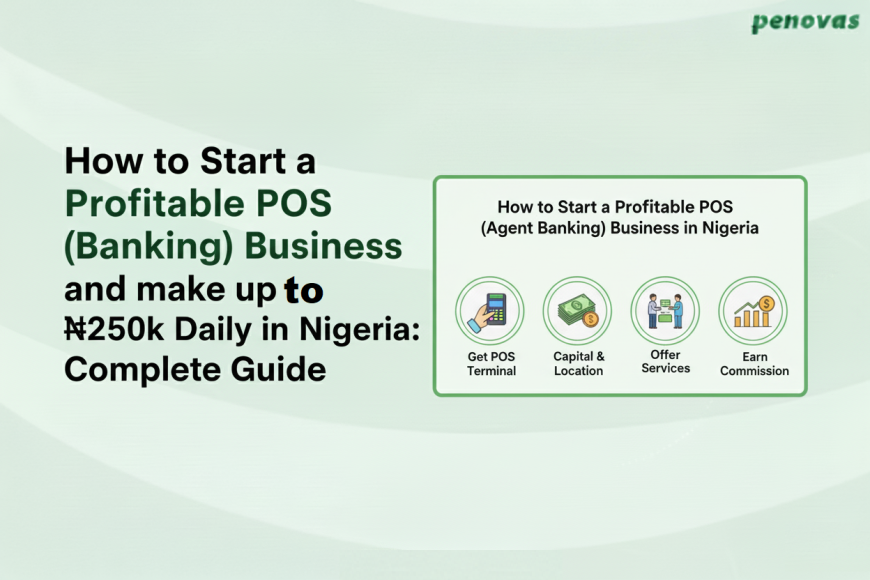How to Start a Profitable POS (Agent Banking) Business and make up to ₦250k Daily in Nigeria: Complete Guide
This guide explains how to start a profitable POS (Agent Banking) business in Nigeria and make up to ₦250k every day. Plus startup requirements, location strategies, partnerships with banks or fintech, common challenges, and practical tips for long-term success.

This long-form guide provides aspiring entrepreneurs with in-depth steps to launch and grow a successful POS (Agent Banking) business in Nigeria. It covers everything from market analysis and startup capital to challenges, profitability, and expansion strategies.
The Point of Sale (POS) business, popularly referred to as Agent Banking, has transformed the way people in Nigeria access financial services. With limited bank branches, poor ATM penetration, and high demand for cash-based transactions, POS agents have become essential. They provide quick, reliable, and affordable financial services, bridging the gap between banks and the people. This makes it not just a social necessity but also a profitable venture for entrepreneurs.
What is POS (Agent Banking)?
POS (Point of Sale) Agent Banking is a system where individuals or businesses are authorized by banks or licensed fintech companies to provide banking services using POS terminals. Customers can withdraw, deposit, transfer, pay bills, and even open accounts without stepping into a bank branch.
Core Services Offered by POS Agents
- Cash withdrawals and deposits
- Instant money transfers
- Utility and bill payments
- Airtime and data top-ups
- Account opening and verification (with certain banks/fintechs)
Why POS Business is Profitable
The growth of POS businesses is driven by several factors that make it sustainable and lucrative:
- High demand: Millions of Nigerians depend on POS agents for quick access to cash and transfers.
- Low entry barrier: The business requires a relatively small investment compared to other ventures.
- Daily income: Transactions happen every day, ensuring constant cash flow.
- Essential service: Since most Nigerians still operate largely with cash, POS services will remain in high demand.
Steps to Start a POS (Agent Banking) Business
1. Conduct Market Research
Before starting, carry out research in your target area. Study customer behavior, existing competitors, and pricing strategies. A location with few agents and high demand will guarantee faster growth and better profits.
2. Select a Strategic Location
Location can make or break your business. Good locations include:
- Markets and commercial areas
- Motor parks and transport hubs
- University campuses and student environments
- Residential estates without nearby banks
- Rural towns with low ATM penetration
3. Prepare Startup Capital
Startup capital usually ranges from ₦100,000 to ₦300,000. This covers POS machine, kiosk or shop setup, branding, and liquidity (cash float). Always allocate more funds for liquidity since cash availability is crucial.
4. Register with a Bank or Fintech Provider
You must partner with a licensed institution. Popular providers include:
- Banks: First Bank (FirstMonie), Access Bank (Closa), Zenith Bank, UBA
- Fintechs: Opay, Moniepoint, Palmpay, Kuda Business, PayCentre, Baxi
Requirements include valid ID, utility bill, passport photos, and sometimes CAC documents for business registration.
5. Acquire a POS Machine
Banks and fintechs provide POS machines after approval. Some require deposits while others give them free but deduct higher commissions. Choose a reliable provider with good network stability.
6. Set Up Your Shop/Kiosk
Visibility is key. A kiosk, umbrella stand, or small shop will do as long as it is strategically located. Use banners, signs, and good branding to attract customers.
7. Maintain Adequate Liquidity
Ensure you have enough cash for withdrawals and sufficient balance for transfers. Running out of cash frustrates customers and pushes them to competitors.
8. Offer Excellent Customer Service
Customers value agents who are reliable and trustworthy. Be polite, confirm every transaction, and always maintain integrity. Satisfied customers will return and recommend your services to others.
Challenges in POS Business and Solutions
1. Network Failures
Problem: Poor network leads to failed or delayed transactions.
Solution: Choose providers with strong network coverage and keep backup internet data.
2. Security Risks
Problem: Cash-heavy businesses are prone to theft and robbery.
Solution: Operate in visible areas, avoid late hours, and deposit excess cash frequently.
3. Fraudulent Transactions
Problem: Fake bank alerts are a common scam.
Solution: Always verify payments through your bank app or POS dashboard before releasing cash.
4. Cash Shortages
Problem: High customer demand may exceed available float.
Solution: Build relationships with shop owners or businesses nearby to exchange cash when needed.
Profitability and Income Potential
The profit you make depends on your location, customer volume, and pricing strategy. Average charges include:
- ₦100 per ₦5,000 withdrawal
- ₦200 per ₦10,000 withdrawal
- ₦100 per transfer
If you process ₦300,000 daily, you can make ₦4,000 – ₦8,000 daily (₦120,000 – ₦240,000 monthly). This can grow significantly in high-demand areas.
Tips for Long-Term Success
- Expand services beyond withdrawals and transfers (bill payments, airtime, account opening).
- Keep accurate financial records for accountability and growth.
- Reinvest profits to open additional outlets.
- Upgrade to smart POS machines as the business grows.
- Focus on trust and integrity to build customer loyalty.
Conclusion
The POS (Agent Banking) business is a thriving opportunity in Nigeria. With proper planning, reliable partnerships, and excellent service, it can generate steady income and long-term success. By solving real financial access problems, POS agents not only earn profits but also contribute to financial inclusion across the country.
























